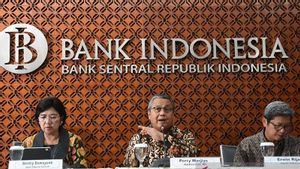The Ministry of Finance (Kemenkeu) reported that Until the end of June 2023, the position of government debt was at IDR 7,805.19 trillion. This figure is equivalent to 37.93 percent of gross domestic product (GDP).
"The government conducts debt management well with controlled risks, including through optimal composition, both related to currencies, interest rates, and dues," said the Ministry of Finance in the latest minutes broadcast today, Thursday, July 27.
VOI noted that the book was higher than May 2023 which amounted to IDR 7,787.51 trillion or equivalent to 37.85 percent of GDP.
Furthermore, the amount of debt until the first semester of 2023 was dominated by the issuance of Government Securities (SBN) with a portion of 89.04 percent. While the remaining 10.96 percent is an obligation originating from financial loans.
"The government's debt to GDP as of the end of June 2023 is at a safe limit (well below 60 percent of GDP), according to Law Number 17 of 2003 concerning State Finance and still in accordance with what has been established through the Medium-Term Debt Management Strategy for 2023-2026 in the range of 40 percent," said the Ministry of Finance.
The government itself states that it always manages debt carefully with controlled risks through optimal composition, both related to currencies, interest rates, and dues.
اقرأ أيضا:
It was stated that the general policy of debt financing to optimize domestic financing sources and utilize foreign debt as a complement, the composition of government debt is dominated by domestic debt, namely 72.49 percent.
Meanwhile, based on instruments, the majority composition of government debt is in the form of SBN which reaches 89.04 percent. In addition, the government prioritizes the procurement of debt with a long medium tenor and actively manages debt portfolios. As of the end of June 2023, Indonesia's debt maturity profile is fairly safe with a weighted average maturity (ATM) in the range of 8 years.
Furthermore, in order to increase debt management efficiency in the long term, the government continues to strive to support the establishment of deep, active, and liquid domestic SBN markets. One of the strategies is through the development of various SBN instruments, including the development of environmental-based thematic SBN (Green Sukuk) and SDGs (SDG Bond and Blue Bond).
"The role of digital transformation in the process of issuing and selling SBN supported by online systems is no less important, able to make debt procurement through SBN more effective and efficient, and credible," concluded the Ministry of Finance.
The English, Chinese, Japanese, Arabic, and French versions are automatically generated by the AI. So there may still be inaccuracies in translating, please always see Indonesian as our main language. (system supported by DigitalSiber.id)
















